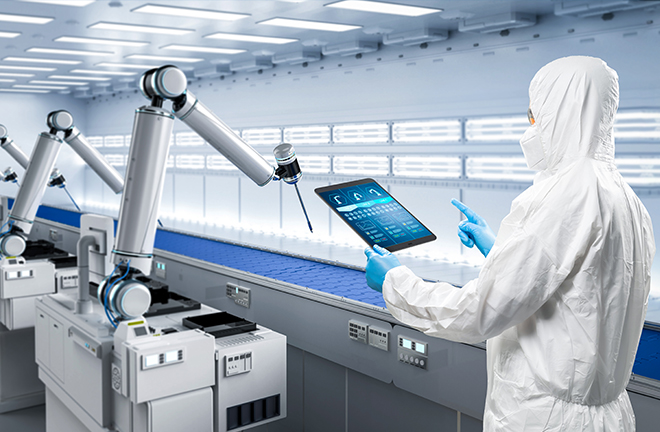Digital technology reshapes labor process

A technician using a tablet to control assembly line robots Photo: TUCHONG
Digital technology has given rise to new industries and new development models. Digitalization of the labor process challenges traditional labor process theory which primarily explains the industrial labor process. The contest for control over the labor process is a core issue in labor process theory, which believes that capital controls the labor process typically by transforming the organization of labor and the skill structure of workers. However, in the digital labor process, digital technology and human labor are deeply integrated, reshaping the organization of labor and workers’ skill development.
The modern factory system and the extensive deployment of automation have considerably improved productive forces. Factory-based labor organization enables economics of scale in spatial and temporal dimensions, highly refined division of labor enhances productivity and facilitates quality assurance, and the labor process is entirely controlled by capitalists through technological, organizational, and normative control.
Technological control is mainly applied in the production process. Machine-assisted production decentralizes control over the labor process to industrial assembly lines. Organizational control largely pertains to the way the labor process is organized. By establishing factory management models suited to large-scale machine production, capital extends its control over the entire factory’s organizational structure, making workers dependent on the factory organizational system. Normative control refers to the ideological influence exerted in the labor process. Capital shapes workers’ emotional identification with technology, production, and the factory through corporate culture building, professional ethics education, and the provision of employee benefits.
In terms of skill development paths, workers gradually master industrial occupational skills by learning theoretical knowledge and operating production tools such as machines and industrial equipment. In terms of skill development timelines, the mastery of industrial occupational skills usually takes longer periods of time compared to the skills required in the primary and tertiary sectors. Concurrently, skills acquired by individual workers must be further developed into technical capabilities of industrial organizations to enhance productivity and gain competitive advantage. The development of industrial occupational skills therefore exhibits strong organizational dependence.
Digital platform companies have emerged as the main organizational model driving economic development in the digital age. Digital platforms are essentially “social technological platforms.” First, digital platforms can organize a vast amount of social resources to engage in extremely large-scale production. Second, platform workers’ actual workplaces are highly dispersed and uncertain, and their workplace relationships are very distant. Third, as digital nomads rely on platforms to conduct business, their work and personal life are highly integrated, and their professional roles are highly diversified. Digital platforms are more reliant on social resources due to their social nature, which renders the digital economy more sharing-oriented.
With the industrial application of digital technology, the direct combination of “labor-physical means of labor” is gradually transitioning to the indirect combination of “labor-data-physical means of labor.” Digital technology has contributed to the desynchronization and flexibility of working time and environments, and has expanded the spatiotemporal scope of capital’s control over the labor process.
In the digital economy, the “labor force” comprises both humans and artificial intelligence. Digital workers rely less on muscle memory and more on cognitive and organizational skills to establish structural relationships between digital tools and digital products, which necessitates higher-level occupational skills. Digital occupational skills become outdated much more rapidly than industrial occupational skills. Advances in digital technology have led to “skill polarization” in the labor market. The fastest growth in employment is seen in jobs demanding either high or low skill levels, while workers with medium-level skills who perform routine tasks that can be automated are at greater risk of being displaced.
Digital technology not only serves to monitor the labor process but also constructs it. Users of digital platforms also participate in the value creation process of digital labor, which is referred to as “audience labor.” While industrial labor based on the factory system serves as the basis of traditional industrial models, digital labor based on digital platforms is gradually becoming the dominant industrial model in the present day. In the process of digital labor, workers are situated in a more open and diverse work environment, wherein they become less dependent on organizations and employment relations become ambiguous. Like industrial labor, digital labor is shaped not only by digital technology but also by social forces, closely tied to social, political, and economic systems. In the digital age, there is a need for a paradigm shift in labor process theory, which can be achieved by continuous theoretical enrichment and innovation.
Wang Xing (professor) and Wang Chunxuan are from the Zhou Enlai School of Government at Nankai University.
Edited by WANG YOURAN
